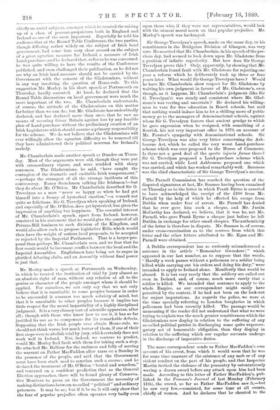Sir George Trevelyan's speech, made on the same day, to
his constituents in the Bridgeton Division of Glasgow, was very sore. He asserted that Mr. Chamberlain, in his speech of the pre- vious day, had seemed to look down upon Mr. Gladstone from a position of infinite superiority. But how does Sir George Trevelyan prove this P Only, apparently, by showing that Mr. Chamberlain found fault with Mr. Gladstone for rejecting one year a reform which he deliberately took up three or four years later. What would Sir George Trevelyan have P Would he have Mr. Chamberlain show respect for Mr. Gladstone by waiving his own judgment in favour of Mr. Gladstone's, even though, as it happens, Mr. Chamberlain's judgment (like Si G. Trevelyan's) was steady and consistent where Mr. Glad- stone's was veering and uncertain P He declared his willing- ness to vote for free education in Board schools, but said that nothing would induce him to let a shilling more of public money go to the managers of denominational schools, against whom Sir G. Trevelyan fosters that ancient grudge to which he gave expression when he resigned, with something of a flourish, his not very important office in 1870, on account of Mr. Forster's sympathy with denominational schools. Sir George Trevelyan was also very bitter concerning the Ash- bourne Act, which he called the very worst Land-purchase scheme which was ever proposed to the House of Commons. Is there not a good deal of the spretn injuria forntm there ? Sir G. Trevelyan proposed a Land-purchase scheme which was not carried, while Lord Ashbourne proposed one which was carried, and which has worked remarkably well. Soreness was the chief characteristic of Sir George Trevelyan's oration.






































 Previous page
Previous page